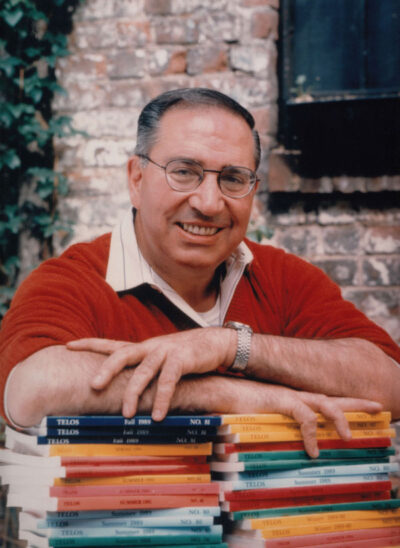 Paul Piccone, like Telos, the journal he founded, was an original, and the strength of his character and spirit inspired not only his journal but everyone with whom he came in contact. He never lacked confidence in anything he confronted, however unfamiliar, and he attacked every new challenge with the same indomitable energy with which he faced life as a whole. He was always “in your face,” but with as much charm as gusto, so he had a way of disarming even his staunchest critics. To friend or “enemy,” he was most assuredly unforgettable.
Paul Piccone, like Telos, the journal he founded, was an original, and the strength of his character and spirit inspired not only his journal but everyone with whom he came in contact. He never lacked confidence in anything he confronted, however unfamiliar, and he attacked every new challenge with the same indomitable energy with which he faced life as a whole. He was always “in your face,” but with as much charm as gusto, so he had a way of disarming even his staunchest critics. To friend or “enemy,” he was most assuredly unforgettable.
The eldest of six brothers, Paul emigrated at the age of fourteen with his family from L’Aquila, Italy, to the United States and settled in Rochester, NY. His father was a tailor, and Paul grew up in a self-consciously working-class environment. Leaving high school before graduating, he worked factory jobs for several years until he decided that he wanted something more. He completed undergraduate studies at Indiana University and entered the doctoral program in philosophy at SUNY Buffalo, where he received a PhD in 1970. Together with other graduate students at Buffalo, he founded Telos, which in 1968 became the leading New Left journal, attempting to come to terms with the political and intellectual turmoil of those years. Granted a position in the sociology department at Washington University in St. Louis, MO, Paul published Telos out of his office. As always, he was able to surround himself with a coterie of like-minded students and colleagues to help him. Owing to promotional problems and tenure, in 1970 Paul became a “gypsy scholar” for a couple of years until he moved to New York City, bought an abandoned building in the East Village, and made it (largely by his own physical labor) into his home and office. For more than two decades thereafter, Paul guided his journal as its editor, mentor, and publisher. In 2000, shortly after his 60th birthday, Paul contracted a rare form of cancer, which he struggled with until he died on July 12, 2004, at the age of 64.
As Alan Sica, one of the Telos editors, observed: “Paul Piccone, through his journal, was a primary agent working on behalf of heightened theoretical acuity, political savviness, and a liberating historical sense that was not available through any other means. . . . He probably felt he and his few, dedicated confederates held a ‘lock on truth’ which distinguished them from mainstream social science. . . . That he behaved ‘irrationally’ along so many professional axes, and that over time he became a tragic, noble figure of myth—the uncompromising Quixote of left-wing cultural and social theory—turned into an article of faith among the ‘critical theory’ crowd. . . . Like a Neapolitan tailor with a pressing deadline, he cursed, he fumed, he sprayed his impatience with mediocrity all around, and he did it naturally and regularly, as if everybody else were blinded by their small ambitions and could not perceive the truths that were so obvious to him.” Another Telos editor, Tim Luke, drew attention to a different aspect of Piccone’s character that is even more indicative of Paul’s legacy: “Much of this apparent bombast came from his unusual voice. And in so many ways, that voice was the quality with which he identified himself—both personally and intellectually. Its sound engaged, enraged, or estranged, but his voice is what most will remember—first, and maybe last—about him. Echoes of this voice gather in his friend’s memories, its conceptual cadence still collects thinkers together, and the power continues to move many in their lives. With everyone’s memories, from his stories, and in the pages of Telos, Paul Piccone’s voice will reverberate across the years for readers and writers.”
Read Paul Piccone’s articles from Telos in our online archive. A selection of Paul’s articles has been published in the anthology Confronting the Crisis: Writings of Paul Piccone, available now in our online store. For more about Paul Piccone and the history of Telos, see A Journal of No Illusions: Telos, Paul Piccone, and the Americanization of Critical Theory, edited by Timothy W. Luke and Ben Agger.





